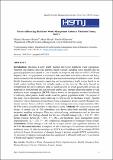Factors influencing Healthcare Waste Management System in Machakos County, Kenya

View/
Date
2019-07Author
Mwania, Michael Musango
Oluoch, Musa
Kimemia, Fredrick
Type
ArticleLanguage
enMetadata
Show full item recordAbstract
Machakos County health facilities have poor healthcare waste segregation,
treatment and disposal practices; patients, health workers including waste handlers and the
general population are exposed to risks of needle stick injuries and infection of HIV/AIDS and
Hepatitis B&C. All population is exposed to risks associated with furans, dioxins and heavy
metals released to the environment through open and crude burning of healthcare waste. World
Health Organization recommends supporting and strengthening a health system based on six
health system building blocks that includes quality service delivery. The study focused on
strengthening the service delivery pillar of health systems in which good health services are
expressed as both personal and non-personal quality care, through addressing aspects of safe
healthcare waste management (HCWM) herein viewed as non-personal services that directly
or indirectly affect patient, health workers and the general population health. The purpose of
this study was to determine factors affecting HCWM system in Machakos County. Specific
objectives were to determine the healthcare waste management process, health Managers role,
human resource factors, and how healthcare waste management policy implementation affect
HCWM system in health facilities in Machakos County. Methods: We used survey research
design. A sample size of 120 respondents was drawn using both stratified random and
purposive sampling techniques. Data was collected using questionnaires and an interview
guide. Results: The findings showed that the role of health managers (β2 = .436, P < .001),
human resource factors (β3 = .065, P < .002), and healthcare waste management policy
implementation (β4 = .275, P < .001) influenced management of healthcare waste system.
Conclusions: Health managers’ role had the strongest positive and significant influence on
HCWM. Recommendations: i) adoption of safe technologies for treatment and disposal of
healthcare waste, ii) refresher trainings on HCWM to all healthcare staff on existing HCWM
policies in Kenya, iii) provision of adequate budget to procure enough HCWM commodities,
iv) provision of adequate personal protective equipment to all health staff, and v) vaccination
of health staff against Hepatitis B.
Publisher
Health Systems Management Journal
Subject
healthcare waste managementCollections
- Articles [44]
- School of Medicine and Health Sciences [160]
